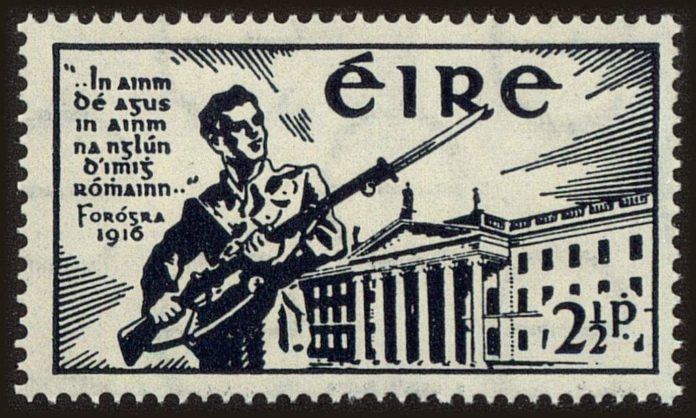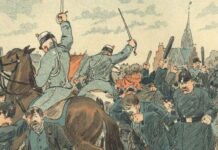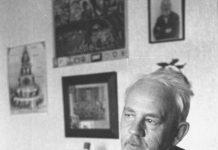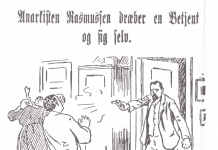Socialistisk Biblioteks Tidslinje med links til begivenheder og personer i 1916.
Se også Index over personer, organisationer/partier og værker (som bøger, malerier, mm.), steder, begivenheder, mv., der er omtalt på hele Tidslinjen, titler og indhold på emnelisterne osv.
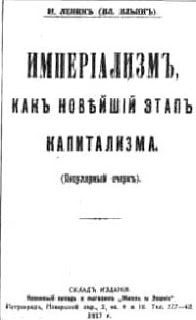
Januar-juni 1916
Lenin udarbejdet pjecen “Imperialismen, kapitalismens højeste stade”, der udgives forsommeren 1917 (forordet af Lenin dateres 26. april 1917).
Links:
Imperialism, the Highest Stage of Capitalism (Wikipedia.org)
Imperialismen som kapitalismens højeste stadium (en populær oversigt). Af Vladimir Lenin (Fra Lenins Udvalgte værker, bind 6, Forlaget Tiden, 1981, side 66-177; online på Marxisme Online).
Imperialism, the Highest Stage of Capitalism: A Popular Outline. By Vladimir Ilyich Lenin (From Lenin’s Selected Works, Progress Publishers, 1963, Vol.1, p.667–766; online at Marxists Internet Archive)
I krig for kapitalisternes skyld: Det handlede Lenins analyse om (Arbejderen.dk, 11. januar 2014). Med bogudrag.
Lenins “Imperialismen” i dag. Af Jonas Foldager (Revolution, 27. oktober 2014). Forord til nyudgivelse af bogen (Forlaget Marx, 2014, 121 s.)
Lenin’s ‘Imperialism’: A critical survey of the economic arguments. By James Doughney (Links: International Journal of Socialist Renewal,
‘The most extreme characteristics of US imperialism come from its relationship to the indigenous population’. By Robert Brenner (Links: International Journal of Socialist Renewal,
Lenin, National Liberation and Palestine. By Gus Woody (RS21, 10 March 2024). Review of Lenin, Imperialism and the National Question. Introduction by Ruth Wilson Gilmore (Verso, 2024, 304 p.). “The publication is heartbreakingly timely.”
Neoliberal Imperialism, The Latest Stage of Capitalism: On the centennial of Lenin’s Imperialism thesis. By Saeed Rahnema (New Politics, Issue 62, Winter 2017). “I will argue that, although the nature of imperialism has not changed, its structures, functions, and other specifications are very different from the imperialism of Lenin’s time.”
Lenin and Bukharin on imperialism. By Phil Gasper (International Socialist Review, Issue 100, Spring 2016, p.69-87). “A century after their first appearance, it is worth evaluating their legacy.”
Lenin’s theory of imperialism: a defence of its relevance in the 21st century. By Sam King (Marxist Left Review, Issue 8, Winter 2014). See reply from Patrick Weiniger: Understanding imperialism (Issue 9, Summer 2015)
Rethinking imperialism (Weekly Worker, Issue 980, October 3, 2013). “Was Lenin right when he called imperialism the highest stage of capitalism? Mike Macnair believes he was very wrong.”
Lenin’s Imperialism in context. By Louis Proyect (The Unrepentant Marxist, June 22, 2008) + Lenin’s “Imperialism” reads like it was written yesterday (July 4, 2008)
Imperialism: The Highest Stage of Capitalism. By Phil Gasper (SocialistWorker.org, Issue 686, December 2, 2008). “… a classic pamphlet that explains how capitalism was transformed by spreading international conflicts.”
Classics of Marxism: VI Lenin, Imperialism The Highest Stage of Capitalism. By Brian Jones (International Socialist Review, Issue 44, November–December 2005). “His short, 128-page book is a refreshing, and devastating, antidote to the professional apologists.”
Lenin and imperialism in the 21st century. By Nick Rogers (Weekly Worker, Issue 543, September 9, 2004). “What is the significance of Lenin’s critique of imperialism today? Was it marred by moralism?”
Notes from the Editors (Monthly Review, January 2004, Vol.55, No.8, January 2004). About “the highest stage” or “the last stage”.
Introduction to ‘Imperialism: The Highest Stage of Capitalism’. By Doug Lorimer (Democratic Socialist Perspective, 2003). Introduction to Resistance Books edition of Lenin’s work (Australia, 1999).
Imperialism – highest stage but one. By Michael Kidron (International Socialism, Issue 9, Summer 1962). “Lenin’s Imperialism was supremely good theory in its day. It picked out the enemy, determined the crucial alliance, and explained what the battle was about. But the lines of battle have been redrawn …”
Lenin on Imperialism. By Leon Trotsky (Fourth International, Vol.3, No.1, January 1942, p.19-21)
Se også:
De marxistiske imperialisme-teorier. Af Claude Serfati (Socialistisk Information, 1. september 2018). “Vi begynder med en kort præsentation af de “klassiske” imperialisme-teorier, som blev udarbejdet i starten af det 20. århundrede. Derefter kommer en vurdering af disse teoriers aktualitet i lyset af en række nutidige forfattere.”
Fra Lenin til i dag. Af Åge Skovrind (Solidaritet, nr.13, februar 2018, s.42-45). “Den globale verdensorden har forandret sig meget de seneste 100 år, men ressourcerne er stadig absurd ulige fordelt på jorden. Giver det stadig mening at tale om imperialisme i dag?”
Imperialism in the 21st Century (ROAPE, Review of African Political Economy, 2018-20). Theme with articles and debates by John Smith, David Harvey, Adam Mayer, Patrick Bond, Walter Daum, Andy Higginbottom, Esteban Mora, Lee Wengraf, James Parisot, Utsa Patnaik and Chinedu Chukwudinma.
Colonialism and the natives. By Moshé Machover (Weekly Worker, Issue 1087, 17 December 2015). “… looking back at controversies in the Second International” +
New context, new focus (ibid., Issue 1092, 4 February 2016). “The colonial question in Lenin’s wake” + The decolonisation of Palestine (ibid., Issue 1112, 23 June 2016)
Review of Richard Day and Daniel Gaido (eds.), Discovering Imperialism: Social Democracy to World War One (Brill, 2011/Haymarket Books, 2012, 951 p.): Imperialism: the classic Marxist debate reviewed, by Paul Hampton and Martin Thomas (Workers’ Liberty, 2 January 2014) + War and Capital, by Todd Chretien (International Socialist Review, Issue 87, January 2013) + Imperialism before Lenin, by Mike Macnair (Weekly Worker, Issue 904, March 8, 2012)
Analysing Imperialism. By Chris Harman (International Socialism, Issue 99, Summer 2003, p.3-81). “Chris Harman takes us through the bloody 20th century.”
Marxism and imperialism today. By Alex Callinicos (International Socialism, Issue 50, Spring 1991, p.3–48). “The question which I address in this article is whether these changes … can still be understood within the framework of the Marxist theory of imperialism.”
Marxist Theories of Imperialism: A Critical Survey (pdf). By Anthony Brewer (Routledge & Kegan Paul, 1990, 300 p.; online at Digamo.free.fr)
Teorier om imperialismen (pdf). Av Tom Kemp (Raben & Sjögren, 1972, 228 p.; online på Marxistsarkiv.se)
The Marxist theory of Imperialism and its critics (1955). By E. Germain [i.e. Ernest Mandel] (Marxists Internet Archive)
Om imperialisme og opportunisme: uddrag af artikler og taler 1899-1923. Af Vladimir Iljitj Lenin (Forlaget Futura, 1973, 91 s.; online på Snylterstaten.dk). English edition: On Imperialism and Opportunism (Futura, 1974, 103 p.)
Se også på Socialistisk Bibliotek:
- Tidslinjen 22. april 1870 om V.I. Lenin
- Emnelisten Den Russiske Revolution 100 år
- Emnelisten Den Russiske Revolution, fra februar – oktober 1917
1. januar 1916
I Karl og Sonja Liebknechts lejlighed i Berlin mødes folk fra venstrefløjen blandt krigsmodstanderne i det tyske socialdemokrati (SPD) og danner Gruppe Internationale, der med Rosa Luxemburgs Junius-bruchure som politisk grundlag, bl.a. udsender nogle nummer af tidsskriftet Die Internationale, før de senere på måneden danner Spartakusgruppen, se Tidslinjen nedenfor 27. januar 1916.
27. januar 1916
Spartakusgruppen (senere Spartakusforbundet) dannes i Berlin af oppositionelle socialdemokrater, bl.a. Rosa Luxemburg, Karl Liebknecht, Clara Zetkin mfl.
Links:
- Spartakusforbundet (Leksikon.org)
- Spartacist League (Wikipedia.org)
- Gruppe Internationale / Spartakusbund (Deutsches Historisches Museum)
- Spartacus League (Spartacists) (Marxists Internet Archive: Encyclopedia of Marxism: Glossary of Organisations)
- Om spartakus-programmet (uddrag). Af Rosa Luxemburg (Marxistiske Klassikere)
- On the Spartacus Programme (1918). By Rosa Luxemburg (Marxists Internet Archive)
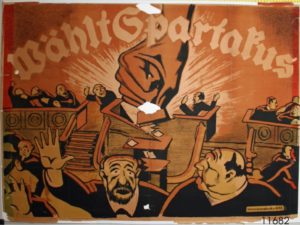
Das Objekt ist ein Wahlplakat des Spartakusbundes / KPD. Die Abbildung zeigt eine große, im Gegensatz zu den Menschen überdimensionale Faust, die ein Rednerpult zertrümmert und mehrere Menschen, die vor dieser Faust flüchten. Der Plakattext lautet: “Wählt Spartakus / Kommisionsdruck der KPD”. (CC BY-NC-SA). Source: Stiftung Schloß Friedenstein Gotha: Museum für Regionalgeschichte und Volkskunde.
Se også på Socialistisk Bibliotek:
- Tidslinjen 5. september 1915 om Zimmerwald-konferencen.
- Personlisten Rosa Luxemburg (1871-1919)
15. februar 1916
Demokrati i Danmark: Ungsocialisten Niels Johnsen idømmes ved Københavns Kriminalret to måneders fængsel for pjecen Kampen mod Værnepligten (Ungsocialistisk Forbund, 1915, 24 s.).
(Se Tidslinjen 7. oktober 1893) om Niels Johnsen (Socialistisk Bibliotek)
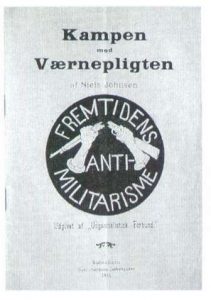
31. marts 1916
Demokrati i Sverige: Stormklockan-kongressen. Svenske myndigheder arresterer og rejser tiltale for landsforræderi mod tre af deltagerne i den Almindelig fredskongres i Stockholm. De tiltalte er bl.a. Zeth Höglund.
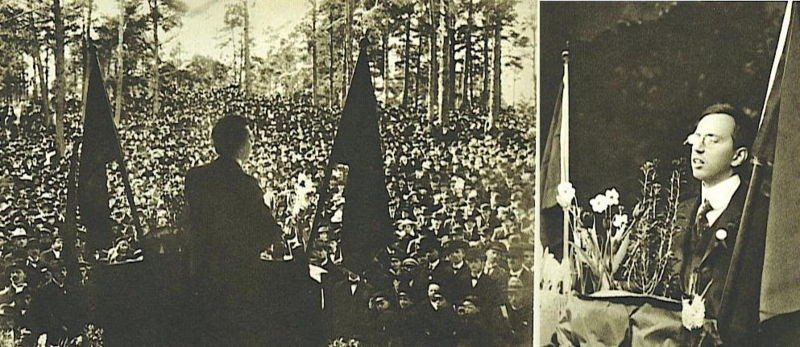
Se:
- Förräderiprocessen (Wiipedia.se)
- Höglund, Zeth (Fredsakademiet.dk)
- Stormklockan (Wikipedia.sv)
Se også:
- Kruse, Alfred (Leksikon.org)
- Zeth Höglund (Wikipedia.sv)
2. april 1916
Den britiske marxistiske historiker og skribent John Saville fødes (dør 13. juni 2009, se denne)
24.-30. april 1916
I Kienthal i Svejts afholdes den anden internationale konference i den socialistiske Zimmerwald-bevægelse.
Se:
Kienthal – the small beginnings of the anti-war tradition (Socialist Worker, Issue 2501, 26 April 2016). “In 1916 socialists arguing against war were a minority, but change was coming. Alistair Farrow looks at how it started.”
The Kiental Manifesto (SocialistWorker.org, April 26, 2016). “John Riddell introduces the manifesto from the follow-up conference to Zimmerwald.”
Se på Socialistisk Bibliotek:
- Teksten: Zimmerwald og Kienthal : 100 år. Af Grimm, Robert
- Linkbox om Første Verdenskrig
24. april 1916

Den irske påskeopstand mod briterne starter i Dublin.
Britiske soldater nedkæmper det ret isolerede oprør,
og 124 engelske soldater og 1330 civile dræbes under oprøret, herunder 15 senere fuldbyrdede dødsdomme, der skaber national stemning for uafhængighed. (Se 12. maj nedenfor).
Illustration: Oprørsfanen fra Centralposthuset i Dublin
Se / See:
- Påskeopstanden 1916 (Wikipedia.dk).
- Easter Rising (Wikipedia.org).
- Easter Rising: From Home Rule to Independence (BBC History; War & Conflicts; 1916 Easter Rising).
- The 1916 Easter Rising (Chris Trueman’s History Learning).
“Why did a small group of people try to take on the military might of what was then one of the world’s major powers?”
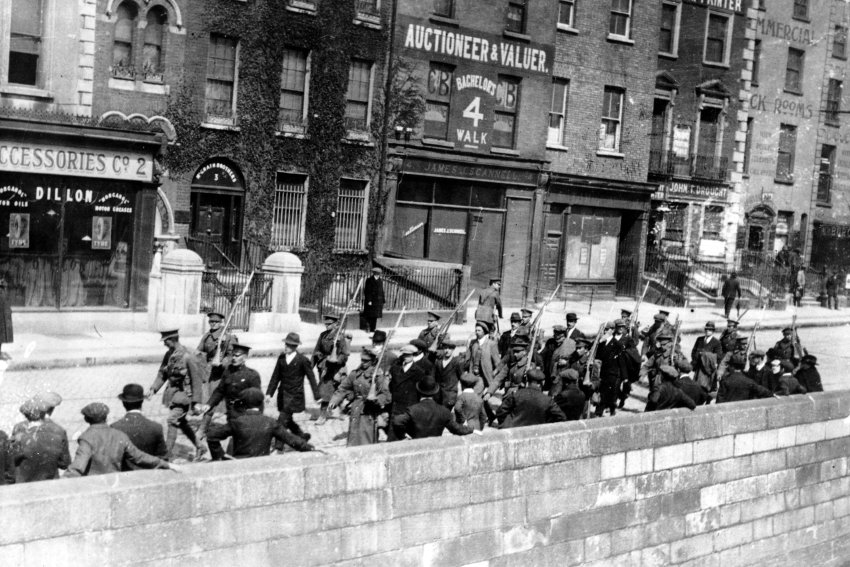
Påskeoprøret 1916. Af Inger V. Johansen (Solidaritet.dk, 31. juli 2019). “Første april 2016 var det 100-årsdagen for Påskeoprøret mod den britiske kolonimagt i Irland. Bag det stod en mindre gruppe af militante irske republikanere – stort set uden folkelig opbakning – men det fik vidtrækkende historisk betydning.” Oprindeligt bragt i magasinet Solidaritet nummer 7, april 2016.
Påskeoprøret i Irland 1916. Af Shaun Harkin (Socialistisk Information, 7. maj 2016). “100-årsdagen bør fejres som en markering imod imperialisme og for irsk selvbestemmelse.”
Påskeoprøret hundrede år efter. Af Inger V. Johansen (Modkraft.dk/Kontradoxa, 25. april 2016). “Påskeoprøret blev det første slag mod den britiske kolonimagt i Irland i en lang uafhængighedskrig.”
The Easter Rising and Irish history (pdf). By Sean Matgamma (Solidarity, Issue 694, December 2023/Workers’ Liberty, 3/75, 25 p.). “The two souls of Irish nationalism? An attempt at a Marxist account.”
The Easter Rising in words, music and film (Counterfire, Lindsey German rounds up some of the writing, music and film inspired by the revolutionary Easter Rising of 1916.”
Ireland’s Easter Rising against colonial rule (SocialistWorker.org, April 21, 2016). “On the 100th anniversary of the Easter Rising, Shaun Harkin challenges the myths about this great rebellion against empire.”
1916: Ireland’s revolutionary tradition. By Sean Ledwith (Counterfire, April 7, 2016; online at Internet Archive). Review of Kieran Allen’s book (Pluto Press, 2016, 240 p.). “Allen’s 1916 shows that the Easter Rising was no pointless sacrifice, but an essential revolutionary trigger to Irish independence.” See also interview with Kieran Allen: Revisiting Ireland’s uprising (Socialist Review, Issue 412, April 2016)
‘All changed, changed utterly’: The historical significance of the Irish Revolution. By Shaun Doherty (International Socialism, Issue 150, Spring 2016, p.83-95). “This chain of events led, at least in part, to the overthrow of British rule in Ireland. In addition, the uprising … became a symbol for future anti-imperialist struggles.”
One hundred years since Ireland’s Easter Rising. Part 1-3. By Jordan Shilton (World Socialist Web Site, 26 – 29 March 2016). “A precondition for the proper commemoration of the centenary necessitates a reexamination of what took place and the context within which it developed.”
Home Rule and the roots of the Easter Rising (Counterfire, February 2, 2016). Part 2: A revolt against Empire (March 12) + Part 3: How the Easter Rising changed the world (March 29). “Counterfire is running a new 3-part series by Chris Bambery on the struggle for Irish independence.”
Ireland’s unfinished revolution. By Ronan Burtenshaw & Seán Byers (Jacobin, 28 March 2016). “The revolutionary period sparked by the 1916 Easter Rising offered a vision of a truly democratic Ireland.”
1916 in Ireland – a rising against empire (Socialist Worker, Issue 2489, 2 February 2016). “At the height of the First World War a rebellion was staged in Britain’s oldest colony. Simon Basketter looks at how Irish rebels took over Dublin 100 years ago.”
Special issue: 1916 and the Irish Revolution (Irish Marxist Review, Vol.4, No.14, 2016, p.3-71). “Our lead article by Kieran Allen systematically demolishes the key myths about 1916 and after …”
Who’s afraid of 1916? By Anne McShane (Weekly Worker, Issue 1097, 10 March 2016). “Admiration of James Connolly should be tempered by criticism.”
Recalling the spirit of the Easter Rising. By Michael Fitzpatrick (Spiked, 27 November 2015). Review of James Heartfield and Kevin Rooney, Who’s Afraid of the Easter Rising? 1916-2016 (Zero Books, 2015, 160 p.).
James Connolly and the Irish Labour Party. By Donal Mac Fhearraigh (Irish Marxist Review, Vol.1, No.2, 2012). “The Labour Party is a million miles away from where James Connolly, one of its founders, envisioned it could be.”
Lenin, Marxism, the Irish Revolution (Workers Liberty, 14 December 2009). Six articles by Sean Matgamnna. See also his A workers’ guide to Ireland (Workers Liberty, 1993/2016).
Dublin 1916 and the ‘blood sacrifice’. By Philip Ferguson (Weekly Worker, Issue 680, July 5, 2007). “On some common criticisms of James Connolly.”
Connolly’s strategy and 1916. By Philip Ferguson (Weekly Worker, Issue 679, June 28, 2007). “It marked the success of the militant labour forces in taking the lead in the Irish national movement.”
Remembering James Connolly on the anniversary of the 1916 Easter Uprising. By Ted Grant and Alan Woods (In Defence of Marxism, 6 April 2007). Reprint of articles from 1966 and 2001.
Ninety years since the Easter Rising. By Mike Rowley (Solidarity, 3/92, 27 April 2006). “The Rising, its consequences and aftermath shaped the situation Ireland faces today.”
Ireland’s Easter Rising. By Pat Stack (Socialist Worker, Issue 1996, 15 April 2006). “Ninety years ago this week Irish rebels rose in revolt against British rule. the debates are still raging today.”
The rising and revisionism. By Paul O’Brien (Socialist Review, Issue 304, March 2006). “We should not let the legacy of the 1916 Easter Rising in Ireland be rewritten and repackaged by right wing historians.” Review of 5 books.
1916 Easter Rising in print. By Sally Richardson (Irish Democrat, 2006). “A selection of recently published or reissued titles dealing with the event.”
The insurrection of Easter 1916. By Andrew Flood (Red and Black Revolution, Issue 11, October 2006). “The Easter 1916 rising in Dublin is often portrayed simply as nationalist blood sacrifice but it can also be examined as an insurrection which was seriously planned to defeat the British army.”
The Easter Rising. Part Five in Alan Woods: The revolutionary dialectic of Republicanism: An Open Letter to Irish Republicans (In Defence of Marxism, October 2003). “For generations the Irish nationalists have assiduously built up a mythology around the Easter Rising.”

Ireland and rhe revolutionary tradition of Easter week. By C.L.R. James (Labor Action, Vol.5, No.14, 14 April 1941; online at Marxists Internet Archive). “Easter week was the herald of the Irish revolution and the first blow struck against imperialism during the war at a time when the Irish revolutionary movement in Europe seemed sunk in apathy …”
The Irish Rebellion (pdf). By Jim Larkin (The Masses, July 1916, p.20-22; online at Marxists Internet Archive). Scroll ned.
Se også / See also:
The discussion on self-determination summed up (July 1916). By V.I. Lenin (Marxists Internet Archive).
Irish Revolution – Easter 1916 at 100: Its Marxian dimension – Lenin and the character of national liberation movements. By Kevin B. Anderson (Europe Solidaire Sans Frontiers, March 2016).
Was the 1916 Rising a “Putsch”? Lenin, Radek, Trotsky. By Sean Matgamna (Workers’ Liberty, 14 December 2009).
Bitter Freedom: Ireland in a Revolutionary World. By Kieran Crowe (Counterfire, March 17, 2016). Review of Maurice Walsh’s book (Faber and Faber, 2016, 544 p.).
Irish Republican Army (IRA, Óglaigh na hÉireann) (Leksikon.org).
Section Irland (Reds – Die Roten; English texts).
Ireland: Republicanism and Revolution. By Alan Woods (Wellred Books, 2005, 135 p.; online at In Defence of Marxism).
A guide to successful defiance. By Daniel Finn (New Left Review, Issue 101, September-October 2016). Review of Diarmaid Ferriter, A Nation and Not a Rabble: The Irish Revolution 1913–1923 (Profile Books, 2015, 517 p.)
Bookwatch: Ireland. By Pat Riordan (International Socialism, Issue 66, Spring 1995, p.139-147).
Se på Socialistisk Bibliotek:
- Tidslinjen 28. november 1905 om Sinn Fein.
- Tidslinjen 26. august 1913 om Dublin-lockouten.
- Tidslinjen 12. maj 1916 om James Connolly.
- Tidslinjen 5. oktober 1968 om borgerrettighedsmarch i Derry.
- Tidslinjen 15. august 1969; britiske tropper indsættes i Nordirland.
5. maj 1916
Amerikanske soldater invaderede den Dominikanske Republik og den 29. november 1916 indfører USA undtagelsestilstand.
Se:
- United States occupation of the Dominican Republic (1916–24) (Wikipedia.org)
- Den Dominikanske Republik (Leksikon.org).
High class muscle men for capital. By Hassan Mahamdallie (Socialist Review, Issue 413, May 2016). “In May 1916 US troops entered Santo Domingo. They would leave eight years later, after reshaping the economy in the interests of US big business. But the legacy of the occupation has been much more lasting both economically and in terms of democracy.”
12. maj 1916
James Connolly (5.6.1868–12.5.1916) henrettes af den britiske besættelsmagt efter Påskeopstanden i Dublin, april 1916. Se om Påskeopstanden 24. april 1916 ovenfor.
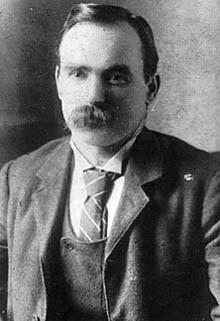
Biografier/Biographies:
- James Connolly (Wikipedia.dk). Kort intro på dansk.
- James Connally (Wikipedia.no). Intro på norsk.
- James Connolly (Marxist Internet Archive; James Connolly Archive). Works in English.
- Last Statement by James Connolly (1916) (Marxists Internet Archive).
- James Connolly (Wikipedia.org). Med links.
- Find a grave: James Connolly (1888-1916).
Artikler/Articles:
Connolly and his influences. By Martin Thomas (Solidarity & Workers Liberty, Issue 664, 22 February 2023). Review of Liam McNulty, James Connolly: Socialist Nationalist & Internationalist (Merlin Press, 2022, 412 p.). “Unlike many previous biographies of James Connolly, Liam McNulty’s tells us a story of Connolly evolving, and shifting and changing politically, under the diverse influences of the intense and lively socialist and revolutionary movements of his time, especially in Britain, in the USA, in Ireland, and in France.”
Who was James Connolly? By Sean Matgamna (Solidarity & Workers’ Liberty, Issue 623, 9 February 2022). “James Connolly is one of the most sympathetic and admirable figures in Irish history and in the history of the international working class movement. There is much to criticise, in my opinion. And there is the hindsight of one hundred years after him.”
They came to bury James Connolly. By Kieran Allen (Irish Marxist Review, Vol.10, No.29, 2021, p.13-24). “Behind Connolly’s insight lay a deep understanding that arose from his commitment to revolutionary socialism and anti-imperialism. Yet this wider legacy has been undermined by two distinct traditions which underplay his Marxism.”
Happy birthday, James Connolly. By Brian Coney (Jacobin, June 5, 2020). “Born on this day in 1868, the republican socialist James Connolly was Ireland’s most famous revolutionary. Over a century after he was killed by the British, his writings on imperial violence and the capitalist degradation of human life are more relevant than ever.”
James Connolly, a Socialist for the present. By Ed McNally (Jacobin, September 19, 2019). “n his recent James Connolly lecture, Labour’s John McDonnell praised the Irish revolutionary as a formative influence on his politics. Connolly’s republicanism isn’t just of historical interest — it tells socialists how to think about democratizing society today.”
Connolly: 150 years on (pdf). By Shaun Harkin (Irish Marxist Review, Vol.7, No.22, 2018, p.58-64). “The 150th anniversary of Connolly’s birth is an opportunity to celebrate his contribution to the international working class struggle and to engage with his ideas to bring about an end to capitalism and imperialism; and the struggle for a socialist Ireland.”
The James Connolly Reader. By Kevin Crane (Counterfire, June 28, 2018). Review of Shaun Harkin’s (ed.) book (Haymarket Books, 2018, 472 p.). “A collection of the writings of James Connolly, the Irish socialist revolutionary, contains still relevant insights about imperialism and national liberation.” See also review by Shaun Doherty (Socialist Review, Issue 439, October 2018) + review by Kieran Allen: James Connolly’s fight for economic and social liberty (International Socialist Review, Issue 110, Fall 2018).
Connolly at 150. By Ronan Burtenshaw (Jacobin, June 5, 2018). “James Connolly was born 150 years ago today. He remains the outstanding socialist of Ireland’s history.”
The Politics of James Connolly. By Derek Wall (Marx & Philosophy Review of Book, 22 December 2017). Review of Kieran Allen’s book (Pluto Press, London, 2016. 206 p.). “Kieran Allen provides the biographical detail for Connolly and places his work and thought within the context of Irish independence struggles and developing Marxist thought at the time of the First World War.”
Who was James Connolly? (Counterfire, October 13, 2017). “Chris Bambery asks what Irish republican James Connolly can tell us about the link between national liberation struggles and the fight for socialism.”
James Connolly and the Irish Citizen Army. By Paul O’Brian (Irish Marxist Review, Vol.5, No.15, 2016, p.54-59). “The Irish Citizen Army (ICA) was a revolutionary army that grew out of the trade union movement during the Lockout in 1913.”
James Connolly in America. By Conor McCarthy (Jacobin, 12 May 2016). “His dedication to workers and anti-imperialism knew no borders.”
James Connolly: a revolutionary remembered (Counterfire, May 4, 2016). “12 May marks the centenary of the state murder of working class hero James Connolly. Chris Bambery reflects.”
James Connolly: a socialist rebel against the empire. Part 1. By Dave Sherry (Socialist Worker, Issue 2107, 24 June 2008). Part 2: When Irish workers united and revolted (Issue 2108, 1 July) + Part 3: Rising up against imperialism and war (Issue 2109, 8 July)
Who’s afraid of 1916? By Anne McShane (Weekly Worker, Issue 1097, 10 March 2016). “Admiration of James Connolly should be tempered by criticism.”
Ireland’s greatest revolutionary (Socialist Worker, US, Issue 631, May 11, 2007). Also online at RS21 (March 26, 2016). “Shaun Harkin tells the story of the Irish Marxist and revolutionary James Connolly.”
The real ideas of James Connolly. By Peter Hadden (Socialism Today, Issue 100, April-May 2006). “Peter Hadden reviews his life of unremitting struggle to advance the interests of the working class and overthrow the existing social order.”
James Connolly and the Easter Rising. By Ted Grant and Alan Woods (In Defence of Marxism, 2001). “Connolly was, first and foremost, a militant workers’ leader and a Marxist. He alone in the annals of the British and Irish Labour Movement succeeded in developing the ideas of Marxism.”
Will the real James Connolly please stand up? By Shaun Doherty (International Socialism, Issue 80, Autumn 1998). Review of James Connolly, The Lost Writings, ed. by Aindrias Ó Cathasaigh (Pluto Press, 1997) and James Connolly, Selected Writings, ed. by Peter Berresford-Ellis (Pluto Press, 1997)
James Connolly: His life and miracles. By Brendan Docherty (What Next? No.20, 2001). “If Connolly had died before Easter 1916 he would appear as a footnote in history, not a cult figure.” See resonse from Raynor Lysaght: In Defence of Connolly (What Next? No.32, 2007).
James Connolly and the 1916 Rebellion. By Kieran Allen (International Socialism, Issue 26, Spring 1985, p.118–122). “Revolutionary socialists have many criticisms to make of Connolly – but we do so from the clear standpoint of being on the same side as Connolly in the struggle against imperialism.”
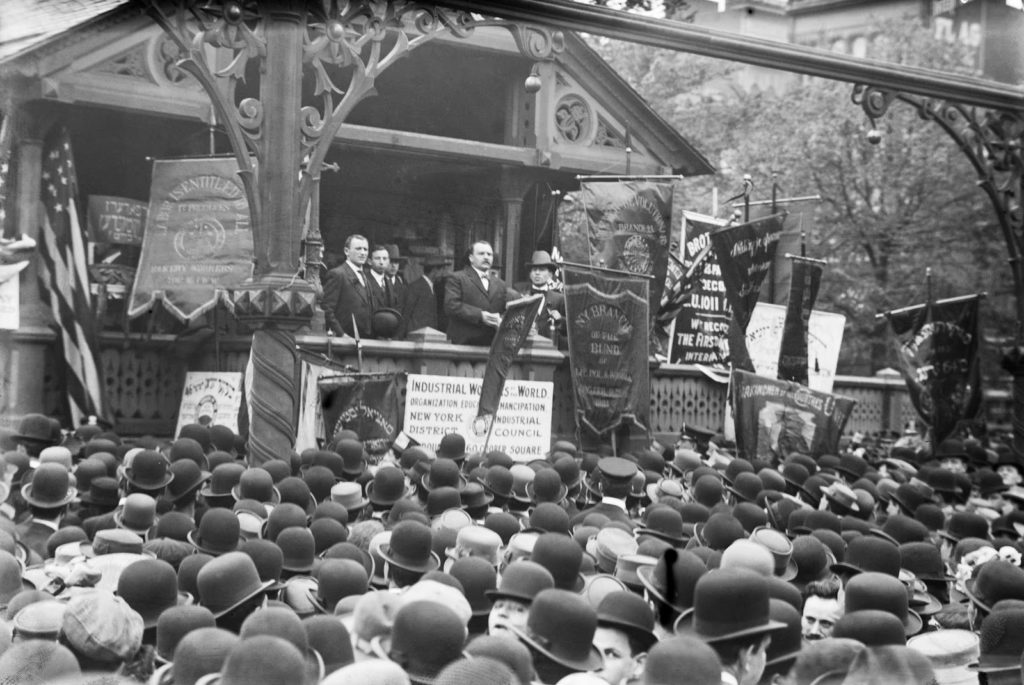
1. juli 1916
Det blodige slag i Første Verdenskrig ved Somme begynder, 19.00 dræbte, første dag. Ophører 18. november.
Se på Socialistisk Bibliotek:
Linkboxen Første Verdenskrig
3. august 1916
Den franske forfatter Henri Barbusse (1873-1935) starter offentliggørelsen af anti-krigsromanen Le Feu (frem til 9. november), trykkes som bog første uge i december i 1000 ekspl. og modtager Goncourt-prisen 15. december samme år. Dansk udgave: Henri Barbusse: Ilden: Et Korporalskabs Dagbog. Oversættelse ved C. E. Falbe-Hansen. 1919, 317 s. (Martins 2 Kroners Udgave).
Se:
- Barbusse, Henri (Fredsakademiet, Freds- og sikkerhedspolitisk leksikon). Kort dansk intro.
- Henri Barbusse (Wikipedia.org). Engelsk tekst m. link til online-udgaver.
- Henri Barbusse (Wikipedia.fr). Fransk tekst.
28. august 1916
Sociologen Charles Wright Mills fødes i Waco, Texas (dør 20.3.1962 i Nyack, New York). Skabte begrebet “det nye venstre”. (*)
Leksikalt/Encyclopedias:
- Mills, C. Wright. Af Michael Hviid Jacobsen (Leksikon.org)
- C. Wright_Mills (Wikipedia.org)
- C. Wright Mills (site). With pictures and booklist.
- C. Wright Mills (Marxists Internet Archive). With Biography and Works.
Artikler/articles in English:
C. Wright Mills’s The Power Elite still speaks to today’s America. By Heather Gautney (Jacobin, 6 December 2022). “Knowing that inequality and powerlessness helped produce European fascism, C. Wright Mills exposed postwar American power and warned of an authoritarian turn in The Power Elite. The book speaks to our own moment of inequality and right-wing anger.”
The will and the intellect. By Daniel Geary (Jacobin, 28 August 2016). “C. Wright Mills was born 100 years ago today. We remember his life and legacy.”
C. Wright Mills’s Cuban Summer. By Michelle Chase Jacobin, 11 September 2017). “In 1960, C. Wright Mills traveled to Cuba to give voice to the country’s revolutionaries. The result was one of the era’s most influential polemics.”
Review essay by Kim Scipes of Stanley Aronowitz, Taking It Big: C. Wright Mills and the Making of Political Intellectuals (Columbia University Press, 2012) (Logos: A Journal of Modern Society & Culture, Vol.12, No.3, 2013; online at Internet Archive). “I think Aronowitz has done an excellent job producing this intellectual and political biography of C. Wright Mills.”
Another side of C.Wright Mills: the theory of mass society. By James E. Freeman (Logos: A Journal of Modern Society & Culture, Vol.10, No.4, 2011; online at Internet Archive). “What makes The Power Elite most relevant today … is that Mills’s thesis relies upon a compelling description of the social structure in America at the bottom level of society, what he calls a mass society.”
Open letter to C. Wright Mills (pdf). By Michael Burawoy (Antipode, Vol.40, No.3, 2008, p.365–375). “My admiration for your work knows no bounds. Your place in the history of sociology is assured. You have rightly been rediscovered as a pioneer of public sociology.”
‘Interview with Kathryn Mills and Pamela Mills’. By Michael Dawson (MR Online, October 2007). “In the six remaining years of his life, Mills …was to come into greater contact with Monthly Review.”
A Mills revival? By Stanley Aronowitz (Logos: A Journal of Modern Society & Culture, Vol.2, No.3, Summer 2003; online at Internet Archive). “C. Wright Mills is exemplary of a vanishing breed in American life: the public political intellectual who, despite his grating message, often received a hearing in mainstream media.”
C. Wright Mills. By Alasdair MacIntyre (International Socialism, No.9, Summer 1962; online at Marxists Internet Archive). “The moral of Wright Mills’ intellectual career is that social reality always takes its revenge on those who do not take it seriously enough.”
Review of C. Wright Mills’ The Marxists. By William F. Warde [i.e. George Novack] (International Socialist Review, Vol.23, No.3, Summer 1962; online at Marxists Internet Archive). “The Marxists is significant both for its opposition to the dominant trends in American social thought and for its place in the political and intellectual evolution of the author.”
Who will change the world?: The New Left and the views of C. Wright Mills. By William F. Warde [i.e. George Novack] (International Socialist Review, Vol.22, No.3, Summer 1961; online at Marxists Internet Archive). “In a “Letter to the New Left,” published in the September-October 1960 New Left Review, he presents a line of argument on social and political problems persuasive to many young intellectuals.”
Mills and Marx. By William F. Warde [i.e. George Novack] (International Socialist Review, Vol. 22, No.1, Winter 1961; online at Marxists Internet Archive). “In The Sociological Imagination C. Wright Mills examines the state of the social sciences in the United States today. Half of the book is devoted to criticism of the dominant schools of sociology in the universities.” 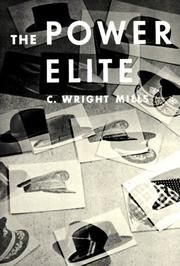
The World of C. Wright Mills. By William F. Warde [i.e. George Novack] (International Socialist Review, Vol.21, No.3, Summer 1960; online at Marxists Internet Archive). “Since he wrote The New Men of Power in 1948 Mills has become more and more disillusioned about the labor movement and its social role and prospects.”
(*) Letter to the New Left. By C. Wright Mills (New Left Review, No.5, September-October 1960; online at Marxists Internet Archive). “Reading your book, Out of Apathy [ed. E.P. Thompson, 1960], prompts me to write to you about several problems I think we now face.”
Litteratur / Literature:
Pål Strandbakken: “C. Wright Mills: Sociologen som samtidsdiagnostiker”. I: Amerikanske tænkere: 14 intellektuelle der ændrede USA, red. Astrid Nonbo Andersen og Christian Olaf Christensen (Informations Forlag, 2016, s.280-298 + 346-348)
Den sociologiske fantasi. Af C. Wright Mills (Hans Reitzel, 2002, 247 s.)
De nye middelklasser: en sociologisk analyse af middelstanden i det tyvende århundredes USA. Af C. Wright Mills (Fremads fokusbøger, 1968, 411 s.)
C. Wright Mills: Letters and Autobiographical Writings (Berkeley, University of California Press, 2000). With chronology, books + hyperlinked index.
“Bibliography of the writings of C. Wright Mills.” In: Power, Politics and People: The Collected Essays of C. Wright Mills. Edited and with an introduction by Irving Louis Horowitz (Oxford University Press, 1967, p.614-641)
18. september 1916
Willy Brauer fødes i Odder. (Dør 12.1. 2004).
Se:
- Brauer, Willy (Leksikon.org).
- Willy Brauer (Wikipedia.dk)
29. september 1916
“Natkongressen” i Socialdemokratiet blev indkaldt 48 timer før, den ekstraordinære kongres starter 29. september 1916 kl. 20.30,og varede 6 timer. Afstemningen foregik 30. september kl. 02:30 , – med resultatet 291 ja, 31 nej, og 3 stemmer ikke – om deltagelse i regering, uden at der var Socialdemokratisk flertal. Folketingsgruppen kunne udpege den første socialdemokratiske minister, i regeringen Zahle (radikal). Det blev Thorvald Stauning, som kontrolminister. (Også salget af de Vestindiske Øer blev vedtaget på den ekstraordinære 6-timers kongres).
Thorvald Stauning bliver 30. september til minister uden portefølje, “kontrolminister”, fra 1916-16.01.1918 og socialminister (uofficiel arbejdsminister) fra 18.11.1918-29. marts 1920, hvor “påskekrisen” starter med kong Christian X’s statskup. (se Tidslinjen 29. marts 1920).
Gerson Trier melder sig ud af Socialdemokratiet i protest mod udnævnelsen.
Cigarreklame med Stauning fra 1936. Teksten lyder: “En god Cigar styrker Tanken” (Det Kongelige Bibliotek).
Se:
- Trier, Gerson (Leksikon.org). Med bilag: Min Udtrædelse.
- Lenin: Hele Ti “Socialistiske” Ministre (Marxistisk Internet Arkiv: Dansk afdeling)
Se også på Socialistisk Biblotek:
- Tidslinjen 26. oktober 1873 om Thorvald Stauning.
- Tidslinjen 20. november 1889 om eksklusionen af oppositionen.
- Linksamlingen Socialdemokratiet
26. oktober 1916
Franske centrum-venstrefløjs-politiker Francois Mitterrand, præsident 1981-1995, fødes i Jarnac (dør 8.1.1996 i Paris).
Se:
- Mitterrand, Francois (Leksikon.org)
- Francois Mitterrand (Wikipedia.fr)
22. november 1916
Forfatteren Jack London dør i Sanoma County, Calif. USA (født i San Francisco, 12. januar 1876).
Se på Socialistisk Bibliotek:
- Linksamlingen Jack London og romanen Jernhælen / Jack London and the novel The Iron Heel
14. december 1916
Dansk folkeafstemning om salget af de vestindiske øer til USA. Folkeafstemningen vedtages.
Se:
De dansk-vestindiske øer (Wikipedia.dk), især afsnit: Salg af Dansk Vestindien til USA
Se på Socialist Bibliotek:
Tidslinjen 31. marts 1917 om salget og historien.
Se også:
- Tidslinjen 3. juli 1848 om slavernes frigivelse i Dansk Vestindien.
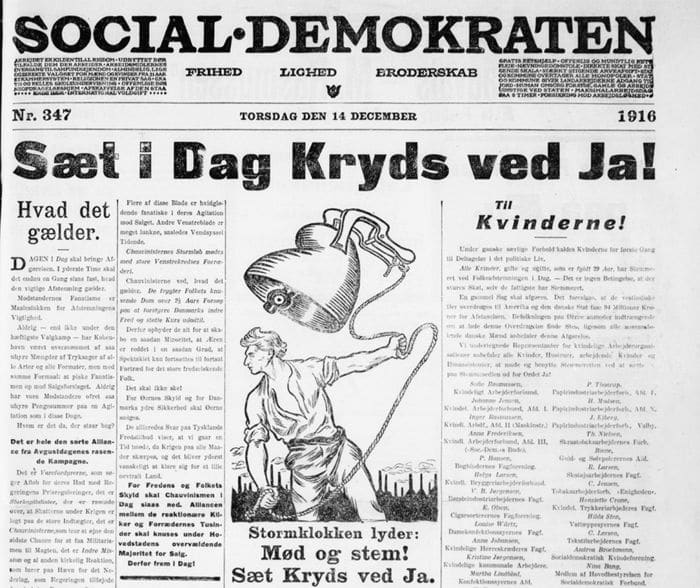
26. december 1916
Norsk Syndikalistisk Federasjon stiftes.
Se:
- Norsk Syndikalistisk Føderation (Leksikon.org)
- Norsk Syndikalistisk Føderasjon (Wikipedia.no)
- Anarkismen og syndikalismen i Norge Gjennom 150 år. Av Harald Fagerhus, maj 2005. (online tekst, ikke trykt?)
Se også:
- Syndikalisme (Leksikon.org)
- Syndikalisme (Wikipedia.no)
















